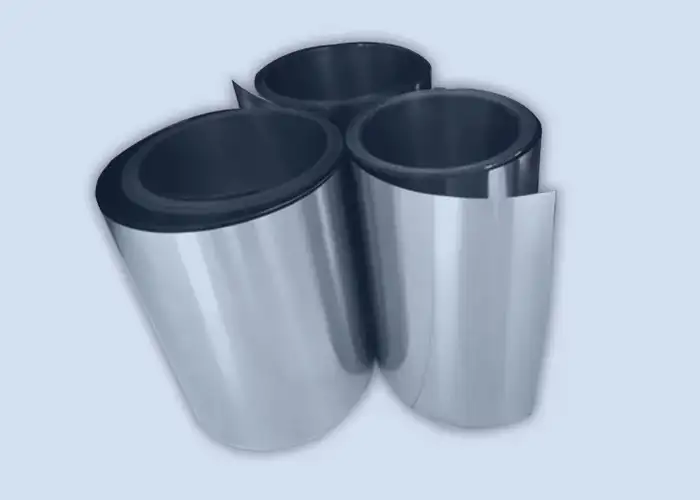
Titanium Foils
Titanium foils are the metal foil product made from titanium alloy with a thickness of 0.10mm or less. Titanium foil offers exceptional characteristics for high overall strength, biocompatibility, corrosion resistance and workability.
Titanium foils are widely used in marine, gas turbine engines, heat exchangerss, condensers, desalination plant, dental alloys, pulp and paper, centrifuges, and so on.
Titanium foil material from us are available in a number of grades for various end-uses.
Customers rely on Seather as a quality titanium foil supplier. Whatever size at whatever tight tolerance of titanium foils you demand, SEATHER here is sure to have it!
| Product Name | Titanium Foils |
| Grades | Gr.1, Gr.2, Gr.4, Gr.9, etc. |
| Standards | ASTM, ASME, DIN, JIS, GB/T, etc. |
| Thickness | 0.01mm-0.1mm |
| Width | 2mm-600mm |
| Edge | Slit/Round/Deburred |
| Quantity Tolerance | ±10% |
| Paper Core Internal Diameter | Ø 150mm, Ø300mm, Ø400mm, Ø500mm paper core, special internal diameter core and without paper core on special request |
| Surface Finish | Mill/Bright/TR/Polishing/Annealing |
| Applications | Aerospace, chemical processing, medical parts production, etc. |
| Packaging | Wooden pallet/Wooden case |
| Payment Terms | 30% TT deposit and 70% balance before shipment, 100% LC at sight |
| Delivery Time | 7-10 working days |
| MOQ | 500 Kgs |
| Shipping Port | Shanghai/Ningbo port |
| Sample | The sample of titanium foil is available |
| Remark | Titanium foils can be customized |
Titanium Foils Materials & Grades
Titanium foil is available in various grades, each with its own unique properties and characteristics. The most common grades of these foils include:
- Titanium Grade 1
- Titanium Grade 2
- Titanium Grade 4
- Titanium Grade 9

Titanium Foil Production Process
The production process of titanium foil involves several steps, from extracting the raw material to the final manufacturing of the thin titanium foils sheets.
Here is a general overview of the titanium foil production process:
Melting and Forming: The resulting titanium sponge is then melted through various methods, such as vacuum arc melting or electron beam melting, to produce a molten titanium metal. The molten metal is cast into ingots or other forms, depending on the desired final product.
Hot Rolling: The titanium ingots are hot-rolled to form a large titanium sheet. This process reduces the thickness of the material while increasing its length and width. Hot rolling helps to achieve the desired mechanical properties and thickness uniformity.
Cold Rolling: The hot-rolled titanium sheet undergoes cold rolling to further reduce its thickness. Cold rolling involves passing the material through a series of rollers at room temperature, resulting in a thinner and more precise titanium sheet.
Annealing: After cold rolling, the titanium foil is subjected to an annealing process. Annealing involves heating the material to a specific temperature and then slowly cooling it. This step helps relieve stresses induced during rolling and improves the material’s mechanical properties.
Surface Treatment: The titanium foil may undergo surface treatments such as polishing or coating to enhance its properties or meet specific application requirements.
Quality Control: Throughout the production process, quality control measures are implemented to ensure that the titanium foil meets specified standards for thickness, surface finish, and other critical parameters.
Slitting and Packaging: Once the titanium foil meets quality standards, it is cut into the desired sizes and packaged for distribution and use in various applications.
It’s important to note that specific production methods may vary among manufacturers, and some may incorporate additional steps or variations in the process to meet particular requirements.
Your Reliable Titanium Foils Manufacturer In China
Titanium Foils: The Ultimate Guide
When you choose to buy titanium foils, there have some important points we need to know before we get started.
What are Titanium Foils?
Titanium foils are the metal foil product made from titanium alloy with a thickness of 0.10mm or less. Titanium foil offers exceptional characteristics for high overall strength, biocompatibility, corrosion resistance and workability.
Titanium foils are widely used in marine, gas turbine engines, heat exchangerss, condensers, desalination plant, dental alloys, pulp and paper, centrifuges, and so on.
Titanium foil material from us are available in a number of grades for various end-uses.
Seather offered titanium foil thickness is from 0.01mm to 0.10mm.
Titanium Foils Applications
Commercially pure titanium foil is typically used in implantable medical applications.
And titanium alloys foils are produced with the addition of vanadium or aluminum for applications such as aerospace industry.
Features of Titanium Foils
Titanium foils possess several distinctive features that make them suitable for various applications. Here are some key features of titanium foils:
- Corrosion Resistance: Titanium is highly corrosion-resistant, even in aggressive environments such as seawater and chemical processing. This property makes titanium foils ideal for applications where resistance to corrosion is crucial.
- High Strength-to-Weight Ratio: Titanium is known for its exceptional strength-to-weight ratio. Titanium foils are lightweight yet strong, making them valuable in applications where both strength and weight are critical factors.
- Biocompatibility: Titanium is biocompatible, meaning it is well-tolerated by the human body. This feature makes titanium foils suitable for medical applications, such as implants and surgical instruments.
- Aesthetic Appeal: In addition to its functional properties, titanium has a distinctive silver-gray color, giving it an aesthetic appeal. This characteristic is considered in applications where appearance matters.
These features collectively make titanium foils a preferred choice in a variety of industries, including aerospace, medical, chemical processing, electronics, and more. The unique combination of strength, corrosion resistance, and biocompatibility makes titanium foils valuable in demanding and critical applications.

Looking For A Trust Titanium Foils Manufacturer?
Contact us today and we’ll put together a quote tailored to your needs.

